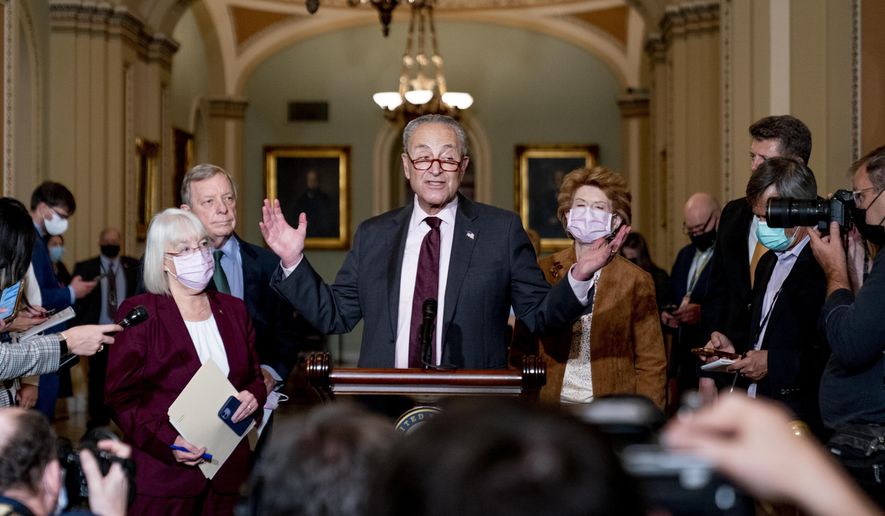Congressional Democrats touted their uniform resolve to finally strike a deal on President Biden’s $3.5 trillion expansion of the federal welfare state on Tuesday, but despite the rhetoric and another attempt by the president to mediate, strong divisions remain over how to move forward.
Senate Majority Leader Charles E. Schumer proclaimed after the Democratic caucus luncheon that there was widespread agreement that a broad deal had to be struck on the spending bill soon.
“We got to get it done, and want to get it done this week,” the New York Democrat said.
The supposed consensus among all 50 Senate Democrats on the need to strike a deal appeared to buoy and energize lawmakers.
“I actually feel much more optimistic than I did a little while ago I think that … there is a strong feeling that we need to get this done and get it figured out and come to do the compromises we need to do,” said Sen. Tina Smith, a Minnesota Democrat.
Despite the good feeling, however, Democrats are still trying to surmount the same party divisions that have stymied a deal for months.
Two long holdouts, Democratic Sens. Joe Manchin III of West Virginia and Kyrsten Sinema of Arizona, have called for not only trimming the overall cost of the bill, but means-testing it as well.
For many progressives, the latter is a non-starter. Rep. Cori Bush, a Missouri Democrat, summed up the argument against means-testing that many on the left are using, saying it was costly and likely to hurt people of color.
“It costs a ton to set up and administer, which takes money from the program itself,” she wrote on social media. “Which leads to many who need the program the most — often black and brown folks — to be excluded.”
The divisions between centrist and far-left Democrats forced Mr. Biden once again to play mediator. The president hosted lawmakers from both groups at the White House to stress the need for unity on Tuesday.
Instead of means-testing, progressives have proposed to lower the package’s overall price tag from $3.5 trillion to about $2.2 trillion. Rather than cut programs, they have reached that figure by proposing to fund the package for five years over the more traditional decade.
For Mr. Manchin, that is not enough. He wants to cut the package down to at least $1.5 trillion. Among his proposals is to impose work requirements on the child tax credit and prevent families making upwards of $60,000 annually from being eligible.
The program, which Mr. Biden expanded earlier this year, grants individuals with children under the age of 6 $300 monthly or $3,600 per year. Individuals with children between the ages of 6 and 18 receive $250 monthly or $3,000-per-year. Democrats want to make the expansion permanent within the reconciliation package.
Mr. Manchin’s attempts to scale back the tax credit come as governmental watchdogs estimate making the expansion permanent would cost as much as $1.6 trillion over the next decade.
Despite the fiscal reality, progressives say configuration to the expanded child care tax credit, apart from making it permanent, is a “red line.”
“This has been the most effective, quantifiable, provable answer to child poverty that we’ve done in a generation,” said Sen. Sherrod Brown, Ohio Democrat. “Why would we scale that back?”
Similarly, Mr. Manchin, who represents a coal-producing state, has signaled his opposition to many of the climate change provisions Democrats hope to include within the package. Last week, Mr. Manchin told the White House he was unable to support a tax credit program to phase out fossil fuels from electricity generation.
The decision left Democrats scrambling for another way to meet Mr. Biden’s pledge to curb greenhouse gas emissions by more than 50% over the next decade.
One alternative, floated by Democratic Sen. Ron Wyden of Oregon, would impose a tax on carbon dioxide, the primary greenhouse gas that contributes to climate change. Mr. Manchin told reporters he is unable to support the idea and that discussions on the topic would not move forward.
“The carbon tax is not on the board at all right now,” he said Tuesday.
As currently written, the massive bill includes a trove of long-sought liberal priorities, including free community college, expanded Medicare and ambitious regulations to arrest climate change.
“I think the American people are tired of these discussions never-ending. They want action,” said Sen. Bernard Sanders, a self-described socialist from Vermont. “And I will reiterate what I’ve said many times, virtually every provision … whether it’s lowering the cost of prescription drugs … expanding Medicare … dealing with the childcare pre-K crisis … is enormously popular.”
• Haris Alic can be reached at halic@washingtontimes.com.




Please read our comment policy before commenting.